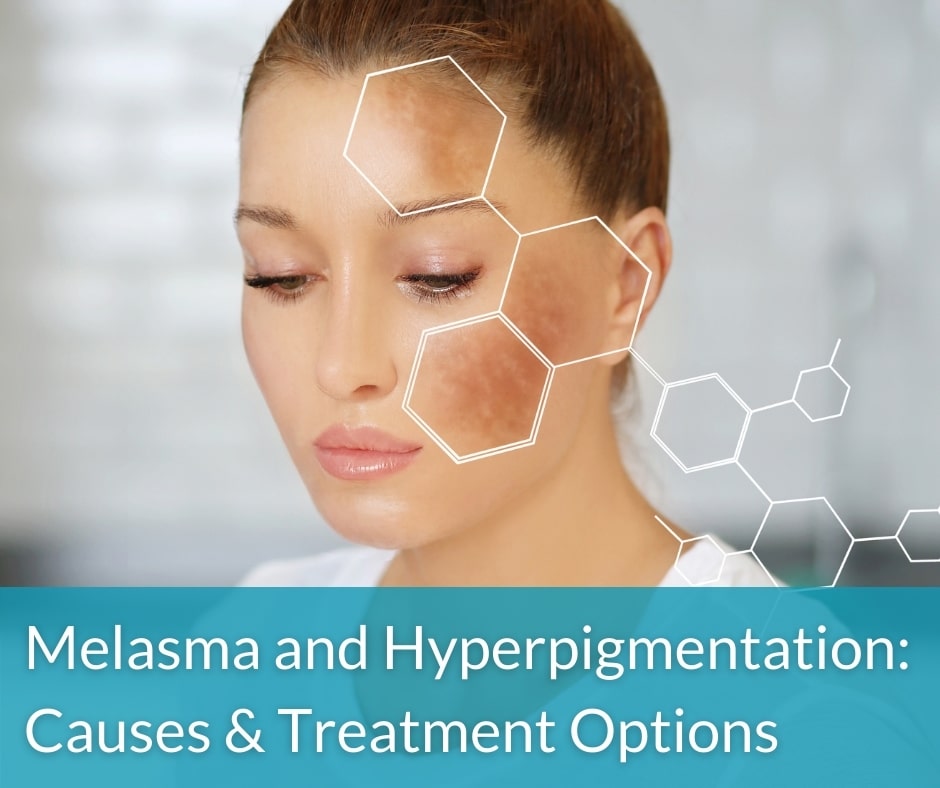All You Need to Know About HyperpigmentationHyperpigmentation is a condition that causes skin discoloration in multiple areas of the body, including the face. This can affect people regardless of their skin color and age. If you or a loved one have hyperpigmentation, you may be curious about the treatments available and how they create a more even skin tone. We’ll cover both points In this guide, as well as other essential details on hyperpigmentation. What is Hyperpigmentation?Hyperpigmentation causes skin to look darker in certain areas than in others. This may manifest in small, isolated zones or bigger areas — even covering the whole body. Hyperpigmentation isn’t dangerous, but could be a symptom of an underlying condition that requires medical attention. People can be affected by different types of hyperpigmentation. Liver spots (also known as sunspots) are caused by an excessive amount of exposure to direct sunlight, particularly in areas touched by UV radiation frequently (such as the face, hands, and back). This is fairly common in individuals who work outside for long stretches, especially without suitable clothing or sunscreen. Melasma is a form of hyperpigmentation most commonly associated with pregnant women, due to their fluctuating hormones. Their melasma may clear up after they give birth, though they could still require treatment much later. Why Do I Have Hyperpigmentation?Hyperpigmentation is due to excessively high levels of melanin in the body: this is the pigment that determines the color of your skin. Sunlight can increase melanin production, as the body tries to darken the skin to protect itself against sun exposure. Skin inflammation can also lead to a boost in pigment production, as a result of a condition like eczema or acne. This is most common in those with darker skin. Specific medications, including antimalarial or topical treatments, can contribute to hyperpigmentation too. However, this may make discolored patches appear gray rather than brown. Addison’s disease, which affects the adrenal glands, is another potential reason for your hyperpigmentation. Discoloration may occur on the elbows, toes, lips, and knuckles. Other signs of Addison’s disease are nausea, fatigue, and dizziness. Acne, inflammation, or skin injuries can also lead to hyperpigmentation. How Can I Treat My Hyperpigmentation?Astra Medicare offers multiple treatments for hyperpigmentation, including: The Perfect Derma PeelThe Perfect Derma Peel can improve the appearance of hyperpigmentation and melasma. Your skin tone should look more evenly balanced and brighter after the recommended number of treatments. The Perfect Derma Peel will also target:
As a result, your skin will appear smoother and younger. However, the Perfect Derma Peel also encourages stronger production of elastin and collagen. This will leave your skin firmer, clearer, and with a stronger texture. Your skin may feel a little sensitive during the peeling process, but that should fade once the treatment is over. It’s crucial that you avoid direct sunlight, or at least minimize your exposure, for a specific period after Perfect Derma Peel sessions. The specialist performing your peel will provide you with advice to encourage proper healing. You may undergo a follow-up Perfect Derma Peel session after around three or four weeks. Clear + BrilliantClear + Brilliant is an increasingly popular laser treatment for patients with hyperpigmentation. A licensed skin care professional will administer the Clear + brilliant treatment by guiding a handheld laser device over the skin. This can reduce the appearance of common signs of aging and promote healthier, brighter skin with a more even tone. Hyperpigmentation should fade after the recommended number of sessions. Glutathione IV TreatmentInjecting vital nutrients into the bloodstream directly, rather than by taking food or oral supplements, enables them to bypass the digestive process. As a result, the body will absorb more of their goodness than it would otherwise. Glutathione is a natural antioxidant that inhibits production of melanin, the substance that creates the skin’s pigmentation. Our Glutathione IV treatment will leave skin lighter and make hyperpigmentation less visible, so your skin tone will be more balanced. It also improves the appearance of blemishes, freckles, and liver spots. Brightening Radiance FacialThe Brightening Radiance Facial improves skin texture and health to leave it with a noticeable glow. This treatment incorporates a specialized cleansing system and carefully chosen ingredients suited to each skin type. You’ll also receive a gentle massage with quartz stones to tackle puffiness. If necessary, we’ll perform extractions to leave your skin looking even healthier. What Else Can I Do to Treat My Hyperpigmentation?Take Care When in SunlightOne of the most important steps you can take when trying to improve the appearance of your skin is to be aware of sun exposure. Follow the below tips to protect yourself against sun-related hyperpigmentation:
Speak to Your DoctorIf you’re concerned about your hyperpigmentation, consider speaking to your doctor. They may be able to offer recommendations you haven’t thought of yet and put your mind at ease. Your doctor could switch you to a new medication if the one currently prescribed is responsible for your hyperpigmentation. How Can You Find Out More About Effective Hyperpigmentation Treatments?Hyperpigmentation can change the appearance of your skin and cause discoloration in multiple areas. This is most noticeable on the face, but could manifest across the entire body in extreme cases. Astra Medicare’s team can provide you with multiple treatments for your hyperpigmentation, whether you want to feel pampered with a gentle facial or try a powerful peel. Schedule your free consultation with Astra Medicare today!
0 Comments
Melasma and Hyperpigmentation: Causes and Treatment OptionsHyperpigmentation is a common condition causing dark patches to appear on the skin. Its appearance may be subtle in some cases, such as freckles or liver spots. But in others, the contrast between the darker patches and the surrounding skin will be more extreme. Melasma is one of the most well-known forms of hyperpigmentation, though the root of its development is slightly different. Fortunately, numerous effective treatment options are available for both hyperpigmentation and melasma. Let’s take a closer look at the causes and solutions to help you find the right treatment for your skin. What causes hyperpigmentation?The term “pigmentation” refers to the skin’s colouring, which is related to a pigment known as melanin. When the body produces too much melanin, this can cause hyperpigmentation in different degrees of visibility. As mentioned above, hyperpigmentation can manifest as freckles or dark patches across the skin. This condition may affect the whole body or specific areas only. For example, liver spots can appear on the face, scalp, and hands in older people. However, it appears, hyperpigmentation can cause a noticeable balance issue in the skin’s pigmentation. This may lead to self-image problems, particularly when the contrast between skin colors becomes more visible than the individual affected would prefer. Hyperpigmentation occurs in all types of skin, though it’s likely to be more visible in people of darker coloring. This is because skin pigmentation in dark skin is stronger than in paler complexions. Hyperpigmentation may be linked to: Acne scarringIn the case of acne, trauma to the skin can trigger hyperpigmentation. This may affect different areas of the face, though it’s commonly seen on the cheeks. This type of hyperpigmentation is also known as post-inflammatory hyperpigmentation, which can also be caused by other skin issues (such as eczema). MedicationsCertain drugs are known to cause hyperpigmentation. These include non-steroidal anti-inflammatory drugs (NSAIDs), antimalarials, antipsychotics, and more. Exact causes vary from one drug type to another. Specific drugs can react with melanin or other substances within the skin to change coloring in one or more areas. Sun exposureExcessive exposure to sunlight is another common cause of hyperpigmentation. Why? Because sunlight stimulates production of melanin, which absorbs UV rays to defend the body against the sun’s harmful effects. That’s what creates suntans. The longer you spend in the sun without protecting yourself with sun block, the more likely hyperpigmentation formation may be. Sun-related hyperpigmentation could appear as a modest cluster of freckles, large age spots, or bigger patches of discoloration in areas exposed to UV rays frequently. These include the hands, face, arms, neck, and legs. It’s crucial to protect your skin from potential sun-related damage, but not just to reduce your risk of developing hyperpigmentation. Skin cancer is, sadly, another well-known effect of excess time in the sun. And cases in Canada have increased significantly in the past few decades, so it’s vital to be sensible with your skin care. What causes melasma?Melasma looks similar to other forms of hyperpigmentation, but it’s actually caused in part by hormonal changes. Pregnant women are likely to develop melasma — that’s why it’s known as the “mask of pregnancy”. Typically, melasma manifests as patches of dark, blotchy skin on the upper lip, cheeks, and forehead. Why does it affect pregnant women? Because hormonal shifts within the body trigger excess production of pigment. Melasma can be exacerbated by frequent exposure to UV rays and heat too. Melasma may start to develop during the first trimester of pregnancy and remain until after the birth. Generally, dark patches will begin to fade, though treatment may be required if they persist. What treatments are available for hyperpigmentation and melasma?Hyperpigmentation and melasma can both be treated. But melasma may require a little more work as it’s related to hormones. A comprehensive assessment of your health and lifestyle may be needed to identify the most effective treatment in the long run. The Astra Medi Spa team offers three innovative products designed to treat hyperpigmentation in its various forms. We’ll invite you to discuss your skin condition with us during a consultation ahead of your treatment. This ensures we choose the right option. The Perfect PeelThe Perfect Peel is a high-end skin treatment formulated to achieve real results for diverse skin types and ethnicities. It contains such powerful ingredients as:
Glutathione is a crucial antioxidant with anti-aging properties. This penetrates the skin deeply to help combat premature wrinkles and oxidation. While glutathione occurs in the human body naturally, it depletes as we age. Kojic Acid is known for its power to lighten the skin and boost the production of collagen and elastin. This brightens and tightens target areas. All of these ingredients work to reduce or remove sun damage, hyperpigmentation, melasma, and create more balanced skin. Clear + BrilliantClear + Brilliant is a powerful laser treatment that rejuvenates the skin from the inside out. It targets the skin’s upper layers to replace damaged skin with healthier tissue, creating a more youthful look across multiple treatments. Clear + Brilliant is designed to enhance skin tone, texture, and appearance overall. It’s also effective at reducing the visibility of fine lines and pores. Quality skincare productsAstra Medi Spa’s expert team offers a wide range of skincare products that can help reduce the visibility of hyperpigmentation. Eltraderm Advanced Native Collagen + HA is formulated to hydrate, soothe, and improve the appearance of damaged skin. Astramed Skin Perfect is an antimicrobial cleanser to revitalize the skin, remove dead cells, enhance skin texture, and cover imperfections. It can create a clearer, cleaner complexion, particularly for people affected by acne. Hyperpigmentation and melasma may cause significant changes in your appearance, but Astra’s team is here to help! Each treatment we offer is undertaken by an experienced professional, and we’ll take the time to understand your condition carefully during your pre-treatment consultation. To learn more about our skin treatments and schedule your consultation, get in touch now! |
AuthorDedicated and passionate Astra Medicare staff. Archives
June 2024
Categories
All
|



 RSS Feed
RSS Feed